‘Film me all you want’ – teenage girls with no fear of police torment one High Street
6 minutes agoDan JohnsonBBC News

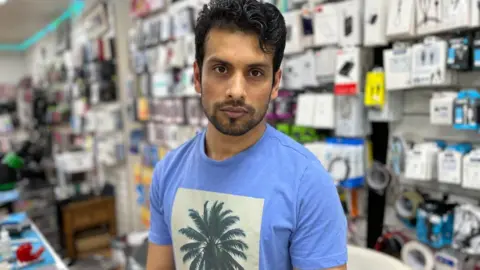 BBC
BBCThe teenager’s sense of invincibility is clear. “The police are never ever going to help you,” she says, “you can film me all you want”.
She’s refusing to leave a shop caught at the centre of a prolonged campaign of antisocial behaviour – windows smashed, items stolen, fires started, staff threatened and attacked.
Muhammad Usman, owner of the mobile phone store in Shirley, near Southampton, is filming her on his own phone – and her juvenile bravado is in full flow. “Touch me and I’ll get you done for assault,” she warns him.
“It’s getting worse, day by day,” Muhammad later tells us from behind his till. His voice cracks, clearly worn down by months of abuse – including, he says, a threat by a teenager to kill him. “I’ve never had this kind of experience in my life before. We’re feeling so helpless.”
What Muhammad and other shopkeepers have experienced over recent months captures the challenge antisocial behaviour poses to police, councils and communities at a time when the government has said tackling it is a key priority.
Three doors down, on the same High Street, Nnenna Okonkwo is also feeling under siege. “It’s ridiculous that it’s just a couple of teenagers causing this mayhem,” she says through tears.

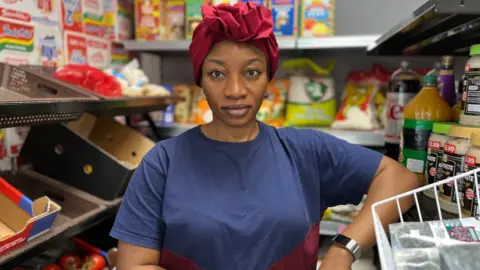
But these don’t seem to be hooded gangsters armed with weapons.
When I eventually encounter the gang, I’m faced with a 14-year-old girl in pink leggings and Crocs.
“I’m not claiming to be innocent because I’m not,” she tells us. “I’ve threatened people and I’ve hit people, I’ll admit to that.”
Her mouth is blue with bubblegum and expletives. “The second you get into one bit of trouble with the police, you fall into it too deep and you can’t get out,” she adds.
She says an injury forced her to give up sport and that behaving badly offers an alternative energy release. “I found that I get the same adrenaline boost from being in trouble with the police and being missing and stuff.”
But there’s little remorse. “I regret what I do, but I don’t say sorry,” she says to cheers from the rest of the gang.
She seems bright but deeply troubled. She admits drinking and she’s vaping while we talk. Muhammad had already told us he had experienced racist abuse – something the girl firmly denies being involved in.
One of her friends chimes in. “I know what we’re doing is wrong but we’re teenage kids, we’re going to have a bit of fun,” she tells us. “I’m sorry for most of the people we have damaged, but I have no sympathy… it’s just one way of taking my anger out.”

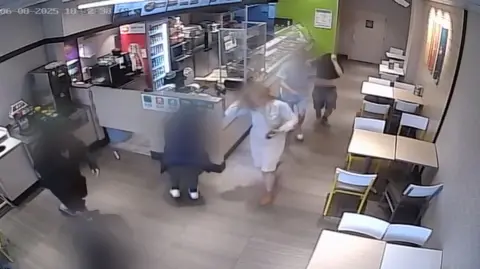
Labour was elected last year promising new “respect orders” to ban similarly persistent offenders from town centres. Due to be introduced under the Crime and Policing Bill currently going through Parliament, breaching the orders would be a criminal offence with potential penalties including a two-year prison sentence, unlimited fines, or unpaid work.
That would partially replace existing civil injunction powers. But the respect orders would not apply to under-18s. An amendment aims to bring that down to 16, but would still not apply to anyone younger.
Ministers have also promised more neighbourhood policing. In Shirley, Muhammad’s complaint is not the number of officers, but their apparent lack of power or willingness to tackle the teenagers. “You don’t see any action against them,” he says. “You feel they are above the law.”
‘We need to be more robust’
The local beat officer, PC Tom Byrne, says he recognises the concern and that antisocial behaviour is being dealt with.
“We do need to remember we are dealing with young people,” he told BBC News in July, saying that while “there will be consequences”, these need to be appropriate when it comes to children.

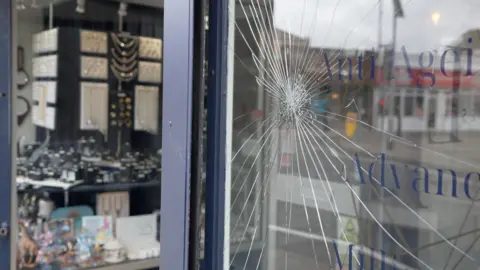
Such instincts to keep young people away from the criminal justice system are deep-rooted in policing – perhaps in the hope antisocial behaviour fizzles out. However, the problem has got worse over the long, hot summer of 2025.
Behaviour like this isn’t just happening on one High Street, and it’s not just teenagers. A few miles along the south coast in Portsmouth, Neil Gibson knows the cost of repeated antisocial behaviour. His car repair business has been hit repeatedly, he believes by the same group of young men. Security camera footage shows one hooded youth hammering a windscreen with a broom until it smashes.
Neil spends some evenings remotely checking his security cameras from home. “I did phone [the police] and say look, if you send someone now, you’ll catch them – perfect situation. I’m afraid they weren’t interested.”
Disheartened, he says he no longer reports every incident.
In nearby Fratton, a former industrial part of Portsmouth now largely residential, we see what the police are up against.
Patrolling the cemetery one evening, PC Chris Middleton attempts to stop a young man zipping down a footpath on an electric scooter – but the masked figure simply ignores the constable and speeds off.
We ask PC Middleton if he can see why some people believe the police are powerless. “Yeah, I feel it,” he says. “At times I really do feel that we need to be more robust and we need more support from the government to tackle these things.”
A short while later, a convicted shoplifter who is wanted on recall to prison walks past – he is searched and arrested.

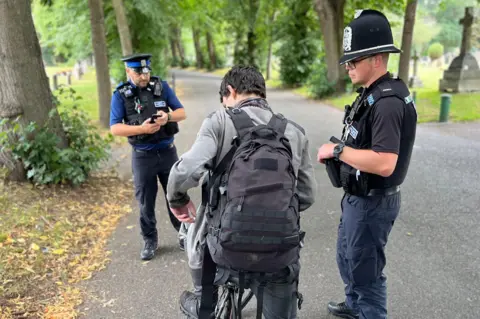
It’s a similar story for councils, many of whom across the country are using community wardens to keep a grip on antisocial behaviour. Jason, a warden for Portsmouth City Council, tells us “a lot of police stuff is being downgraded to antisocial behaviour”, multiplying his workload.
Cllr Matt Boughton, chair of the Local Government Association’s safer and stronger communities committee, has a similar view – telling BBC News that councils “are increasingly having to step in when police resources are stretched…putting extra pressure on already stretched councils, pressure which is unsustainable”.
How can these issues in the communities we’ve visited – and many others like them across the country – really be solved, then?
‘I regret all of it’
Someone whose role involves working alongside the wider criminal justice system is Donna Jones, Hampshire’s police and crime commissioner (PCC). The former Conservative councillor feels the police need a change of approach to dealing with youths and their parents.
“I think the response from the police, to be absolutely honest with you, has been to take a slightly slower approach but some of these young people are committing some really horrible, nasty offences,” she tells us while visiting shopkeepers in Shirley. She says they are being plagued by “an urban street gang made up of quite a high number of young girls”.
“What we need to be doing is also putting the parents more on the record for some of this stuff too so perhaps some change in legislation that does make parents much more accountable.”

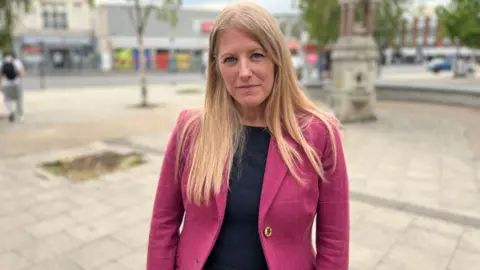
Authorities already possess a range of powers, including civil injunctions, community protection notices, dispersal orders and criminal behaviour orders – the original antisocial behaviour order (ASBO) was replaced in 2014. They can also fine parents and even remove social housing.
But not all of these are applicable to children, and using the ones which are, at scale, will end up criminalising more children. Such measures require time and evidence to obtain, straddling police and councils and concerning often vulnerable young people.
There have been arrests. A teenager has now been charged with 22 offences, including assault, theft, arson, criminal damage, breaching a dispersal order and racially aggravated harassment. After missing an earlier hearing the teen appeared at Southampton Youth Court last week and is due to appear again next month.
After months of persistent antisocial behaviour, the situation in Shirley has calmed down in recent weeks.

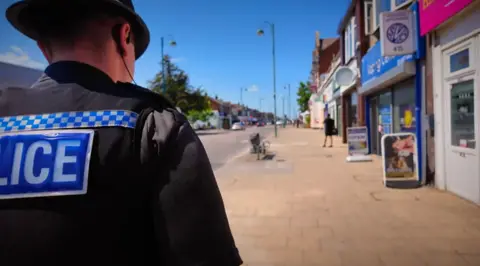
Responding to the BBC, Policing Minister Sarah Jones said “for too long, people have not seen police patrolling their streets”. She said “this government has increased police patrols in high-crime areas across the country through our Safer Streets Summer Initiative”.
Pledging 3,000 more neighbourhood police on the beat by March 2026, she said “we are sending a clear message: crime will be punished”.
And on Thursday the prime minister is due to announce measures to give communities more power to “seize boarded shops” and “block gambling and vape shops on their High Street”.
Hampshire Police told us it had “endeavoured to respond to as many reports as possible” of antisocial behaviour on Shirley High Street but “had to ensure this was balanced against the increase in emergency calls” over the summer months.
Away from the mayhem, we did find some more positive news.
As the summer draws to a close and kids return to school, Jaiden, 15, recalls the hours he spent in a police cell after being arrested. From the sofa of his home in Shirley, he tells us he was causing trouble at shops “nearly every day”.
“It was fun getting people mad but then I realised after a while it wasn’t.”
His mum Kylie says she pleaded with the police to act, having felt she’d lost her son to peer pressure. “Two or three times I asked them ‘just arrest him’. They said we can’t due to his age, we’re going to just have to bring him home. There’s not much we can do.”
He reads the list of rules he and his mum have since signed in a voluntary “acceptable behaviour contract”. They include him not stealing, making threats, or using foul or abusive language and leaving shops when ordered. If he complies, he can avoid court.
Jaiden vows to never go back to that way of life. “I regret all of it,” he says.
More on this storySouthamptonHampshire & Isle of Wight